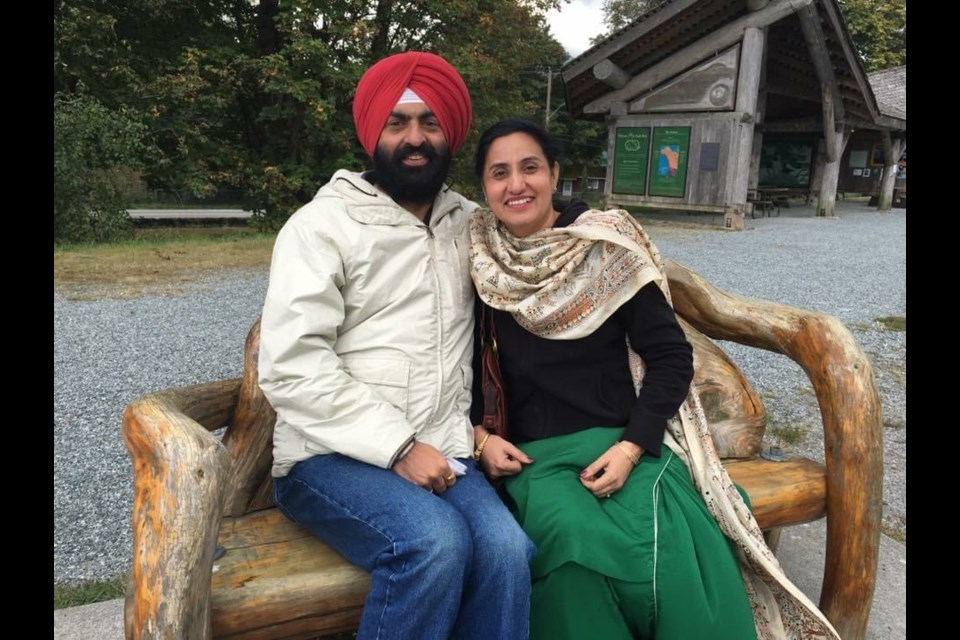India is in the midst of a devastating third wave of the pandemic. To date, an estimated 234,083 people have died and there have been more than 21 million confirmed cases of COVID-19, according to the .
On May 6, India recorded 414,188 new cases over 24 hours.
Grewal’s sister, Navdeep Kular and family live in the commercial hub Gurugram, southwest of New Delhi. His brother-in-law, a businessman in his early 50s, caught COVID-19, and had to be hospitalized.
He was so overcome by the virus that he struggled even to speak.
He has now been home about a week, and is recovering, though he lost about 10 kilograms since first becoming ill three weeks ago.
While in hospital, it was difficult to sleep with all the alarms ringing that signalled patients needing help, Grewal said of his brother-in-law’s experience.
Things have only grown worse in local hospitals since.
"Yesterday in a nearby hospital, the oxygen ran out, and 22 people died," said Grewal, who is a veterinarian at Squamish’s .
Even hospitals can't get enough oxygen for patients.
"Oxygen supplies, oxygen concentrators, are being sold on the black market," he said. "People are going to any extent to get their hands on oxygen concentrators."
The aid of other countries, including Canada, which is sending vials of the antiviral drug Remdesivir and ventilators, has yet to trickle down to the folks in need, Grewal said.
In this sister's condominium tower, 85 people currently have COVID-19. Two have passed away in the last day, he said.
"There is literally no one now, who has family back there who is not affected. It has been so bad."
His sister's son — his nephew — lives in Mumbai and also caught COVID-19, but his symptoms were milder.
For the family, stress and worry are ever-present, said Grewal, adding that some days, he calls his sister once in the morning and once at night to check-in.
"For my brother-in-law, we were really scared," he said, adding that there is emotional trauma for all involved. "He could barely speak. I could only imagine what he was feeling when he was in a worse situation.
"My sister's family has lost neighbours, lost friends, lost relatives.”
His brother-in-law doesn't even know how he contracted the virus.
"Hard to say. He is a very careful guy," said Grewal.
Economic impact
Gurugram is a financial and technology hub that is usually bustling, but it has transformed from being in lockdown to everyone in basic survival mode, Grewal explained.
"Everyone is locked in," he said, noting his sister's family has not opened the front door of their condo for a week.
"There is hardly any activity happening."
People can be seen on the street, hooked up to oxygen because there are no beds in the hospital and also outside the Gurdwaras — temples — which have commandeered oxygen to help whomever they can.
"They are getting it from the market for whatever price," said Grewal.
While his immediate concern is for his family, he worries about the country's recovery as well.
Because of this outbreak and the handling of it by the country’s leadership, Grewal fears there will be a brain drain post-pandemic.
His nephew is an example of that. The young man has started looking for somewhere he can move to.
"He is saying, if this is the situation, is it worth living here?” said Grewal. “He is also in the corporate world and a very capable guy, so I fear that India, because of this health pandemic handling, will lose some of its best and brightest."
Part of Indian culture is to save for a rainy day because people don't count on the government to help them, said Grewal.
"The government is not going to come to your rescue; you have to help yourself. So, the whole entire country now is fending for itself."
At least in Canada, and B.C., commented Grewal, the government is proactive, and there is adequate health infrastructure.
"Vaccinations are being done and the majority of people are aware that masks have to be worn; businesses are enforcing them, government is enforcing them — they could do more, but at least by and large, they are being careful," he said.
While his family in India is vaccinated, he said in that country people race to be vaccinated.
Here people debate getting it.
If people here who protest the protocols or doubt the seriousness of COVID-19, could see what is happening with their own eyes — if one of their own loved ones was affected — they would change their tune, said Grewal.
"Even if you think this virus variant that is in your community is mild, it could go two notches up within a week. It can mutate, and you will really bear the brunt of that," he said, noting the last wave in India wasn't as severe as this third wave.
He added that the whole situation is a lesson to cherish every day you are alive.
"Love the loved ones. Kiss your wife," he said.
"Money is not everything. You have to enjoy life."
For those who want to donate funds to help folks in India, Grewal said is a trusted organization.




